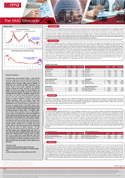Mercado Released [29 June 2015]:Whats for the Greeks?
Whats for the Greeks?
If Greeks fail to pay the US$1.7 billion it owes the IMF tomorrow, might be worse for the lender than the Greeks. Under the fund’s policy, countries that miss payments are deemed to be in “arrears” rather than in “default.” If Greece fails this will blow the IMF’s reputation as the world’s lender of last resort, especially to emerging markets countries like China and India. It may become tougher for IMF to win support for future bailouts. We believe that going forward the scrutiny will increase on countries that can either be considered wealthy in their own right or are part of a larger geo-economic structure like the euro zone. Greece’s non-payment would land Greece in a club of countries in arrears that currently includes Zimbabwe, Sudan and Somalia. These three countries have overdue payments of US$1.8 billion. The US$26 billion to be repaid by Greece is almost four times the total of overdue funds in the IMF’s history. Also, Greece has a US$3.9 billion bond held by the ECB maturing on July 20, 2015. A default to ECB would probably freeze emergency liquidity to Greek banks. According to IMF, once a nation misses payment, it sends a cable urging a country to pay up promptly. Greece would be ineligible for further bailout money until the arrears are cleared. Two weeks after missed payment IMF would contact Greece’s IMF governor to urge ‘full and prompt settlement’. Within one month the IMF chief will then inform the board that a payment has been missed and the information would only become publicly available on the website after three months. IMF can only force Greece out of its membership only after two years of missed payment. On this background the Greek markets have gyrated new twist. The ASE (Athens Stock Exchange) Index rose 16.0% to 797.5 last week, after it plunged and fell 11.3% the week before that. Although Greek companies make up about 0.1% of the broader Stoxx Europe 600 Index, they have been detecting the European stock moves in recent weeks. More interesting, the 30-day correlation between the Euro Stoxx 50 and the ASE has reached 0.7 from almost zero in April 2015.

